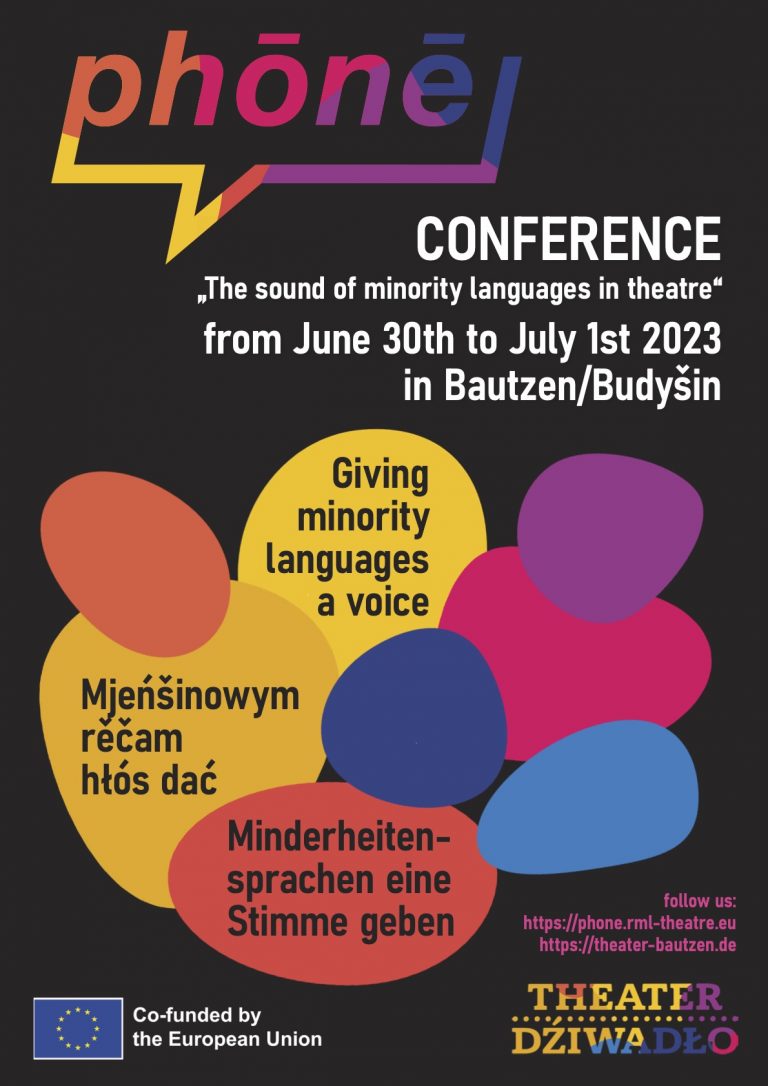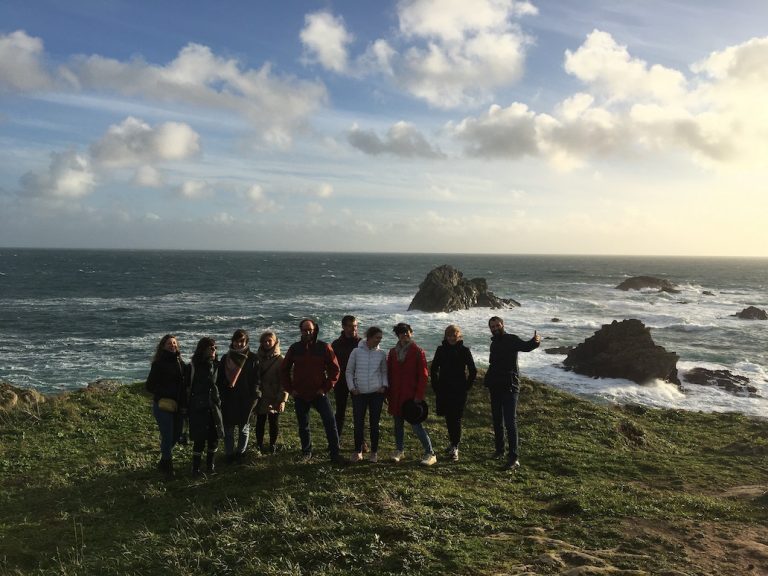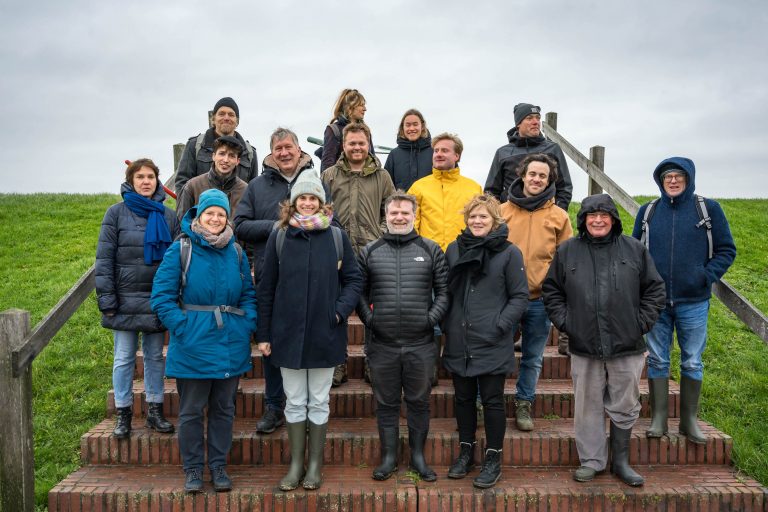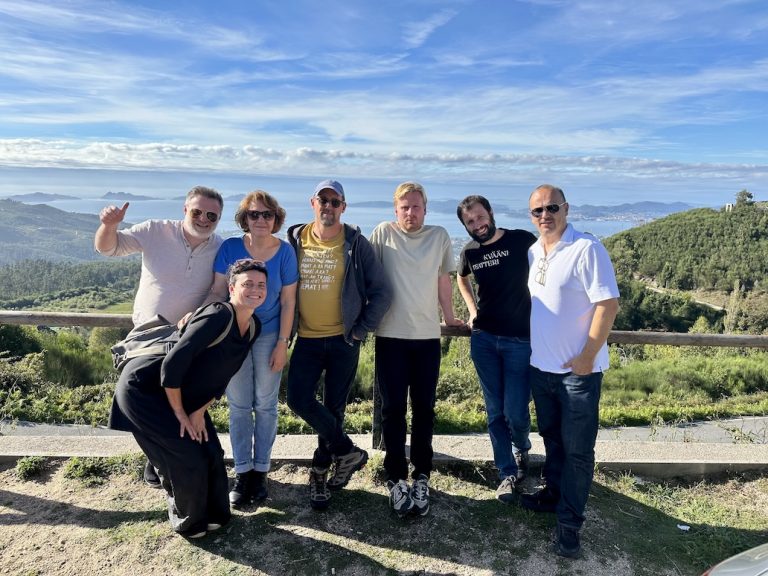
At a conference in Bautzen at the Deutsch-Sorbisches-Volkstheater, theatres from all over the world present their work and their language communities to each other.
The main objective of the conference will be to identify concrete examples of good practices and grass-root actions as well as building new synergies, encouraging cross-disciplinary actions. The conference will highlight the different dynamics and dimensions from the perspective of collective action in the form of various panels.
Together we want to explore how we can support each other’s work in the future, breaking new ground for Minority Language theatre sector and improving their standing nationally and internationally.
This conference is in line with the International Decade of Indigenous Languages, which has declared by the United Nations General Assembly for the between 2022 and 2032 to draw attention to the critical status of many Indigenous languages across the world and encourage action for their preservation, revitalization and promotion.
Programme
Friday, 30.06.23
10:00 – 12:00
The sound of minorities
WELCOME by Theatre Bautzen and managment team phōnē and Markus Franke – director general of department of the arts in the state of ministry of science, culture & tourism, Saxonia, Germany
Theatrical Moment – Voices on stage (1,5h)
FUEN – Bérengère Vogel, Germany and DOMOWINA – Judith Scholze, Germany
12:00 – 13:00
Indigenous cultures in Theatre and their (political) challenges
(Conference Part I – main stage)
1. Columpa Bobb – Coast Salish, First Nation, Canada
2. Rebecca Duncan – Squamish, First Nation, Canada
3. Maitland Schnarr – Noongar, Artistic Director, Yirra Yaakin Theatre Company, Australia
4. Eric Johnson & Loko Lipscomp – Artistic Directors, Honolulu Theatre for Youth, Hawaii
14.00 – 14:45
Main Stage
Narske Bajki oder Frau Müller dreht am Rad
(Foolish fairy tales or Mrs. Miller turns the wheel) in lower sorbian – puppet play
VR Project “Kusunda – speak to awaken”
Minority Language Dictionary by Fran Nuñez and Inger Birkelund
KUSUNDA: is an interactive virtual reality experience that explores what makes a language fall asleep and what it takes to wake one up. Lil Bahadur, an indigenous Kusunda shaman, is resigned to the fact that he forgot his mother tongue, whil his granddaughter Hema is determined to revialise the langauge.
15:00 – 18:00
First theatre network of world’s languages in danger
(Conference Part II – rehearsal stage)
1. Madelena Gonzalez – The Case of Minority Theatre in the Era of Globalization? – ICTT, Avignon University, France
Contemporary theatre is a rich source for increasing the visibility of communities generally perceived by others as minorities, or those who see themselves as such. Whether of a linguistic, ethnic, political, social, cultural or sexual nature, the claims of minorities enjoy a privileged medium in theatre.
With reference to some examples from France and Canada, this presentation will address the central question of the place and status of apparently marginal forms of theatre in the era of globalization. Not only do these works illustrate how minority theatre can throw into question the dominant paradigms that govern society, but they also suggest their own more flexible frameworks for theatrical activity. Theatre, particularly when it stems from the so-called margins or from a minority group, can provide a challenge to the paradigms of western hegemonic culture, simply by staging alterity and particularity. In the context of the cultural homogenization attendant on globalization, it can create a space for freedom, difference, and cultural specificity, while also possessing a universal dimension or resonance since it speaks through and about the collective to the wider community, whether that community be regional, national or international. Even if minority theatre often stems from a specific cultural, linguistic or political situation, and the need to affirm or reclaim that specificity, in many cases it can speak to the majority about the minority and thus open up important new cultural dialogues between the margins and the mainstream.
2. Carsten Sinner – Linguistic Imperialism – University of Leipzig, Germany
The contribution deals with the question of how language (via an image drawn of it directly– “only peasants speak like this”–or indirectly–the dominant language is used and taught in schools, the minoritised language is not–is used to exclude speakers, and how in turn this exclusion then is or can be an important factor in the decline of minoritised languages. Besides aspects such as self-hatred and linguistic paranoia that characterise diglossic contexts, the positions of critics of the change in the role of dominant languages to be brought about by normalisation are also thematized, since they also contribute to obstructing the change of status of languages. This is the case, for example, of the claim that subsidies for translation into (or from) minoritised languages are an “undemocratic irregularity” or that subsidising cultural projects in a minoritized language are a “unjustifiable waste of money only explicable with wokeism”.
3. Jan Budar – Sorbian Digitality – Director of Foundation for the Sorbian People, Germany
Jan Budar, director of the Foundation for the Sorbian People (has the complete overview of digitization programs/projects created so far, because the foundation has funded much of it – dictionaries, translator machines, read aloud function – to future or current projects, such as the Fraunhofer Institute and speech recognition). He will, of course, try to get the hang of what could help the theater, to what extent can live language translation take place via digital platforms.
4. Sietske Poepjes – Political speaker, Friesland, The Netherlands
5. Daniel Alfreider – Political Speaker, Ladin, Itlay
INTRODUCTION for CHARTA by Thomas Cloarec and Dirk Neldner
19:30
Opening Night Schrebergartenblues – Trügerische Idylle – (Allotment gardenblues – Deceptive idyll)
Saturday, 01.07.23
10:00 – 13:00
The variety of RML Theatre in Europe
(Conference Part II – rehearsal stage)
1. Eduard Werner – Aspects of Sorbian soziolinguistics – University of Leipzig, Germany
2. Marton Illes – The unknown treasury of Europe’s largest ethnic minority – Operative leader, Independent Theater Hungary
Roma communities are very diverse regarding their culture, language, too. In the last 7 years we researched the isolated and hardly known Roma theaters, organized festival, translated and recorded their work, developed their capacities and built a network and also a collection on this unknown treasury: romaheroes.org
3. Hanna Pilecka & Michal Kuliczenko – Karaim Language in Poland
Karaim means three things: language, nationality and religion.There are about 100 Karaims in Poland, not many more in Europe. We try to survive as a nation by performing on stage, publishing journals and books, showing our heritage at conferences, starting new projects. The folk ensemble who used to speak Karaim from stage at the moment concentrates on dance and singing, but your inspiration made us plan putting on a musical, adaptation of a Karaim legend from Crimea, where we formed as a nation.
4. Tomasz Wicherkiewicz – RML Theatre in Poland – University Poznań, Poland
Contemporary Poland is a monolingual and ethnically homogenous country – yes, it is almost true… But at the same time, more than a dozen minority communities (regardless of official policy, terminology, or recognition) live their ethnocultural lives in their native languages.
The presentation will present the role of theatre in the preservation, maintenance, and/or revitalization of several minority language communities in Poland, with case studies of Wymysiöeryś in Wilamowice, Kashubian in Pomerania, and Lithuanian in the Suvalkija region.
5. Mia Fors & Erling Fredriksson – Meänkieli – Artistic Directors, Tornedalsteatern, Sweden
As we approach our 40th anniversary, Tornionlaakson Teatteri reflects on its journey. Initially,
it served as a captivating amateur theater, playing a significant role in the Swedish
government’s recognition of Torne Valley people as a minority group. Over the past two
decades, our focus has shifted towards professional productions and nurturing cultural
talents. Now, we stand at the threshold of an exciting new phase. Our aspirations include
elevating the artistic caliber of our professional productions, expanding participation in
amateur theater, embarking on larger national tours, and forging international collaborations.
6. Jordi Pérez i Soldevila – The catalan theatre – Artistic Director, cia. Sargantana, Spain
An Independent performing arts company in Catalonia. In our 20th anniversary we would like to present you our journey as a catalan independent creators. After two decades of constant defy, we face a fast, superficial and hiperconnected world with the wish to develop a slow, deep and really-connected art. Is it possible from a small culture such as the catalan?
VR Project “Kusunda – speak to awaken”
Minority Language Dictionary by Fran Nuñez and Inger Birkelund
KUSUNDA: is an interactive virtual reality experience that explores what makes a language fall asleep and what it takes to wake one up. Lil Bahadur, an indigenous Kusunda shaman, is resigned to the fact that he forgot his mother tongue, whil his granddaughter Hema is determined to revialise the langauge.
15:00 – 18:00
Workshops in Groups
Action points for the new established theatre network
Charta of minority language theatre – Moderator: Thomas Cloarec and Dirk Neldner
20:30
Summer Theatre
The Addams Family
Sunday, 02.07.23
10:00 -13:00
rehearsal stage
Future of phōnē
next application // network // visibility // interim evaluation
Internal meeting of all present theatre and phōnē team
Charta of minority language theatre
Presentation and results of Frederik Bennema (Hanzehogschool Groningen) of the interim evaluation and interviews
14:00 – 19:00
Sight specific excursion to sorbian countryside and old town Bautzen
21:00
Farewell evening at Theatergarten



